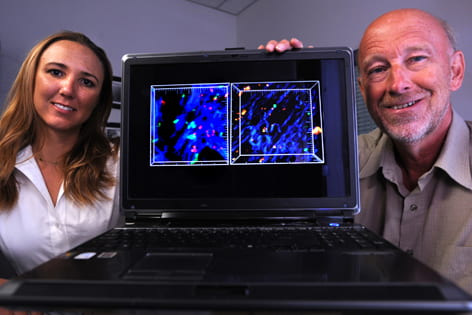Circumventing autoimmunity
The immune system is the body’s military force, assigned to protect against disease and infection. But sometimes, the T cells and B cells that carry out this vital mission turn against their host and mistakenly attack healthy tissue in a process called autoimmunity.

The immune system is the body’s military force, assigned to protect against disease and infection. But sometimes, the T cells and B cells that carry out this vital mission turn against their host and mistakenly attack healthy tissue in a process called autoimmunity.
Diseases driven by this autoimmune response – rheumatoid arthritis, multiple sclerosis, type 1 diabetes, psoriasis and others – can have long-term damaging effects, and medical researchers continue to search for effective treatments.
UC Irvine immunology researchers, led by physiology & biophysics professors George Chandy and Michael Cahalan, are advancing research on treatment of autoimmune diseases. This month, they published a study in the journal Immunity showing autoimmune response can be blocked while allowing normal immune system responses to fight off viral and bacterial infections and cancers.
“A major challenge for autoimmune therapy is to shut down the disease-causing immune cells without compromising their ability to fight off infections and cancers,” Chandy said. “Most existing medications for autoimmune diseases shut off the entire immune system, making the body susceptible to other illnesses and infections.”
This breakthrough points to possibilities for new drugs that selectively block autoimmune response in chronic inflammatory diseases, such as multiple sclerosis, while allowing the immune system to remain intact. Cahalan says such therapies also can be useful for organ and bone marrow transplants in which drugs that ward off tissue rejection are toxic.
“The impact of this study is far-reaching,” Cahalan said. “Chronic autoimmune diseases affect millions, and to have a treatment that selectively shuts off this response can improve quality of life immeasurably.”
Using two-photon microscopy, UCI researchers captured immune cells’ real-time dynamics as they interact during an immune response. In their study, they describe how a compound synthesized from sea anemone toxin can bind with a specific type of immune cell, the effector memory T cell, to shut off autoimmune response in living inflamed tissue without affecting immune cells capable of combating influenza virus and Chlamydia bacterial infections.
Chandy and his colleagues helped create the compound, which is being developed by Airmid Inc. as a safe and effective medicine for autoimmune diseases inadequately treated by current therapies.
